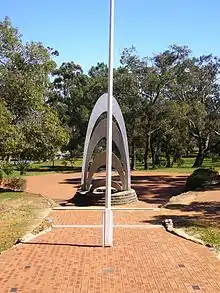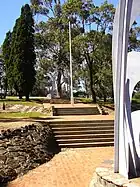Blackboy Hill, Western Australia
Blackboy Hill was named after the Australian native "black boy" plants, Xanthorrhoea preissii, which dominated the site which is now absorbed into Greenmount, Western Australia.
| Blackboy Hill Commemorative Site | |
|---|---|
Blackboy Hill | |
| Australia | |
 Memorial and flagpole aligned to setting sun on Anzac Day | |
| For Australian Imperial Force | |
| Location | 31°53′49″S 116°02′44″E |
| Statistics source: | |
| Designated | 31 March 2006 |
| Reference no. | 4479 |
Originally a military camp,[1] the facilities and adjacent structures were on the hill that is now used by St Anthony's Primary School and Church, and Greenmount Primary School. The remaining land (which has been left as a memorial to the troops who used the training camp) is known on official documents and maps as the Blackboy Hill Commemorative Site, but local signage tends to refer to the location simply as Blackboy Hill.
First World War
During the troop build up for the First World War, the site was a military training camp used to house large numbers of Australian Imperial Force (AIF) troops before they left for the various battlefront locations in Europe and the Middle East. Facilities were moved from other parts of the metropolitan area to improve facilities which were quite basic.[2]
Troops were transported to the adjacent Helena Vale Railway station and marched across to the camp, so as to not interfere with the working of the Eastern Railway.[3]
Blackboy Hill Post Office opened on 29 August 1914 and closed on 30 November 1918, defining the period of occupation of the site.[4] An office of the same name was opened from 1929 until 1932, when it was renamed Greenmount Hill.
Around April 1919, following the end of hostilities, the Imperial forces camp was turned over to the Health department to act as a fever hospital, treating Spanish flu.
In the 1930s unemployed relief workers utilised the camp area.[5]
During the Second World War, the site was also used extensively by the 2nd AIF and other Australian military forces.
Railway station
Blackboy Hill was a named railway stopping place between Bellevue and Swan View between the 1940s and 1960s, it was not related to the training camp or first world war troop movements.
Publication
The Camp Chronicle:the soldiers paper, was a locally produced newsletter recording details of life in the camp before disembarkation for overseas service.[6][7]
Blackboy Hill Commemorative Site
The commemorative site is a small 0.5 hectare site on the southern edge of the former camp site, adjacent to Innamincka Road, Greenmount Hill. It is bounded by a 1.5-hectare (3.7-acre) public park to separate it from the adjacent schools and residential area.
In recent times, the main annual event at this site are the Anzac Day commemorations, which centre on a memorial named after the location. The Anzac memorial is on a segment of ground that is between the two primary schools. It is maintained by the Mundaring Council, and has a committee that oversees management of the site. The sunset service and the dawn service – as well as an all-night vigil – are maintained by the Bilgoman District of the Scout Association of Western Australia and the Returned and Services League of Australia.
Most of the original larger site is now covered by housing development, but up until this began in the early 1990s, remnants of the army camp and many associated rubbish pits were visible.
Centenary revived interest
At the approach of the centenary of the usage of the site (2014-2015), renewed interest in the site and its functions emerged in Western Australian media.[8][9]
There had been accounts much earlier that give understanding of the importance of the site — such as in 1937 in the Western Mail,[10] with the story preceded by verse about Battalion Eleven which had formed at Blackboy:
They were the boys from the Western State,
Brave Battalion Eleven;
They did not tarry, they did not wait,
When the call was given.
First to respond to their country's need
Nothing they feared, nor death did they heed.
Brave Battalion Eleven!— S.M. Harris
Having been written in a time when returned troops would have been still alive to share stories and anecdotes about the camp, the 1937 era reminiscences had material which are not so easy to find in the 2013/2014 reporting of the site.
Book
The 2013/2014 Lotterywest funded project to produce a book was being conducted by Valerie Elliott and Shannon Coyle from the Katherine Susannah Prichard Writers Centre[11][12][13]
A considerable number of people contributed to the volume, including local military historian Paul Bridges,[14] then of the Guildford Historical society, formerly of the Mundaring and Hills Historical Society.[15] who wrote the introductory chapter Overview: BlackBoy Hill Training Camp.
The contents include chapters by a range of over ten authors, including research done by pupils of the adjacent Greenmount Primary School.[16]
Archaeology
Shane Burke of Notre Dame University in Fremantle has overseen archaeological work in the 2000s on the area and has worked with students to ascertain what can be discovered, despite considerable urban development and changes in the area.[24][25][26][27]
Notes
- Australia. Army. Australian Intelligence Corps (1914), Map of Midland Junction and Greenmount district, H.J. Pether, Government Lithographer, retrieved 10 December 2014
- Y.M.C.A. camp work, tomorrow's great event. (note: Vacuum Oil Company's wood & iron building from Fremantle (270' x 60') bought for 250 pounds (less than 1/4 of cost) transported free to Midland Junction to be erected as social home for soldiers in camp. Enthusiastic assistance by business and work people. Swan express, 9 July 1915, p. 5c,d; 16 July 1915, p. 5a-b
- Edmonds, Jack (editor) (1976) Swan River colony : life in Western Australia since the early colonial settlement, illustrated by pictures from an exhibition mounted by West Australian Newspapers Ltd. as a contribution to celebrations for the state's 150th year Perth : West Australian Newspapers, 1979.ISBN 0909699208 -p 45 – "Into camp" – first recruits marching into camp
- Premier Postal History. "Post Office List". Retrieved 11 July 2010.
- Edmonds, Jack (editor) (1976) Swan River colony : life in Western Australia since the early colonial settlement, illustrated by pictures from an exhibition mounted by West Australian Newspapers Ltd. as a contribution to celebrations for the state's 150th year Perth : West Australian Newspapers, 1979.ISBN 0909699208 – page 64,and 65 – stating 5,000 men were present in 1930
- "The "Camp Chronicle."". Western Mail (Perth, WA : 1885 - 1954). Perth, WA: National Library of Australia. 4 August 1932. p. 2. Retrieved 9 December 2014.
- Camp chronicle : the soldier's paper.Midland Junction [W.A.] : Camp Chronicle, 1915–1918. - Battye Library catalogue notes that it was – Printed and published by the "Camp Chronicle Printing Works", Helena Street, Midland Junction, Perth, Western Australia for the proprietor, Herbert James Lambert. Includes special edition of issue no. 1 on blue cloth; presented to Lt. Col. J.S. Battye, Camp Commandant of the Blackboy Hill training camp, the probable same publisher as that which published the Swan Express newspaper
- "Remembering Blackboy Hill training camp". abc.net.au. 19 August 2014.
- "100 Years on - revisiting Blackboy Hill - ABC WA - Australian Broadcasting Corporation (ABC)". Archived from the original on 26 August 2014. Retrieved 22 August 2014.
- "CHAPTER 1". Western Mail (Perth, WA : 1885 - 1954). Perth, WA: National Library of Australia. 9 December 1937. p. 9. Retrieved 22 August 2014.
- "Blackboy Hill is Calling". blackboyhill.blogspot.com.au.
- "Katharine Susannah Prichard Writers' Centre Homepage". Archived from the original on 26 August 2014. Retrieved 22 August 2014.
- "What's On? - State Library". www.slwa.wa.gov.au.
- "Debt of Honour introduction by Paul Bridges - Western Australian Museum". Western Australian Museum.
- "Lifting the lid on Blackboy Hill". perthnow.com.au. 21 April 2014.
- KSP Writers' Centre (2015), Godfrey, Joanne (ed.), Blackboy Hill Is Calling, Barnett, Colin, (Foreword by.) (Author of introduction); Everett, Valerie, (Produced by.) (Book producer), Katharine Susannah Prichard Foundation Incorporated, ISBN 978-0-9925029-3-5
- "The West Australian - Perth, WA, National & World News". The West Australian.
- "Moving re-enactment honours Goldfields WWI troops". ABC Goldfields WA. 18 August 2014.
- Orr, Aleisha (9 September 2014). "Fremantle honours 849 fallen soldiers" – via WA Today.
- "The West Australian - Perth, WA, National & World News". The West Australian.
- "Events". www.anzacfremantle.com.au.
- "Anzac Centenary: Long journey into Great War nightmare, as WA troops depart Fremantle for WWI | ANZAC Centenary news | Perth Now". Archived from the original on 27 October 2014.
- G, Claire (30 October 2015). "The Road to War and Back: 2014 Centenary Events: Blackboy Hill and Fremantle Troop Departures". roadtowarandback.blogspot.com.au.
- Gregory, Claire (1 November 2013). "The Road to War and Back: Revisiting the Past- the Archaeology of Blackboy Hill". nla.gov.au. Archived from the original on 17 March 2018. Retrieved 5 January 2020.
- "The West Australian - Perth, WA, National & World News". The West Australian.
- "270". www.nd.edu.au.
- "Talk: Archaeological Secrets of Blackboy Hill". allevents.in.
Further reading
- De Burgh, H. C.(1983) Blackboy Hill commemoration site, Perth, Western Australia Perth, W.A. H.C. de Burgh, 1983.
- (2007) History of Blackboy Hill.- the Gallipoli memorial was erected in 1958, designed by Ean McDonald, which has been subsequently added to. Chariot Apr. 2007, p. 29.
- Western veteran (2003) Focus on memorials. Details of war memorials in Western Australia: Bunbury, War Dogs Memorial (Baldivis, W.A.). Blackboy Hill Commemoration Site, Memorial to Fallen Soldiers (Midland, W.A.): Western Veteran. March 2003, pp. 12–13.




